| It's always a pleasure to encourage young scholars, so I'm pleased to welcome Lura Amandan to "Clutching My Pearls" this week. Ms. Amandan is a postgraduate student at the University of Reinlegen in Germany. Her doctoral thesis is focused on early critiques of capitalism in European literature, and with the kind permission of her faculty advisors, I am sharing an excerpt from her truly groundbreaking work-in-progress concerning Jane Austen and capitalism. My six questions for Austen scholars post is here. |
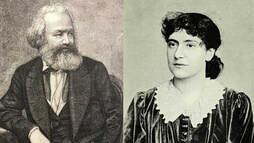 Karl Marx and his daughter Eleanor: was her name inspired by Austen? (Source: British Library)
Karl Marx and his daughter Eleanor: was her name inspired by Austen? (Source: British Library) I am not referring to Austen's well-known portrayals of the landed gentry and the lesser nobility, but rather, her subtle attacks on the pernicious influence of consumerism. To a startling extent, the buying and selling of things and the rise of the urban bourgeoisie forms a backdrop to her so-called marriage plot novels. Scholar David Daiches called Austen "a Marxist before Marx."
It is no exaggeration to say that Austen shows us whether a character is good or bad by their reaction to consumerism. Two of Austen’s heroines never step inside a store--Elizabeth Bennet and Fanny Price. And, significantly, the heroines who do go shopping always live to regret the experience. It is only the fops and fools who like to shop, as we will see. Austen’s message could not be clearer: Capitalism is the root of all evil. Let’s critically take the novels one by one...
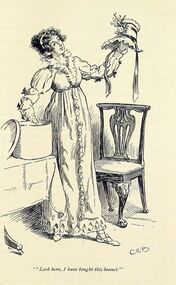 CE Brock illustration, Lydia and her bonnet
CE Brock illustration, Lydia and her bonnet Fanny Price of Mansfield Park is the most misunderstood and maligned of Austen's heroines today. But it is long past time for a critical reappraisal, starting with the fact that Fanny never goes near a store. This should put an end to the endless debates in Austen circles about Fanny Price—she is in fact a courageous anti-capitalist. Even when she visits her family in Portsmouth and is hungry after dinner, she sends her brothers out to buy biscuits and buns for her, rather than go into a shop herself.
Edmund Bertram commissions his older brother Tom to buy a piece of jewelry for Fanny while Tom is in London, but Mary Crawford is the truly admirable character who recycles a superfluous necklace that she doesn't wear very much, and gifts it to Fanny.
In Emma, it is the foolish air-headed Harriet Smith who admires every shiny item at Ford’s store. Just as Mrs. Palmer aggravates Elinor in Sense and Sensibility because her “eye was caught by every thing pretty, expensive, or new; who was wild to buy all, [and] could determine on none,” Harriet cannot make up her mind about anything and wants to buy everything when she shops at Ford's. When Mrs. Weston and Frank Churchill happen to walk by, Emma is embarrassed to be seen in the store and she is quick to let them know “I am here on no business of my own." She is still at Ford's trying to hurry Harriet along with her purchases, when she discovers she is trapped--Miss Bates comes in and begs her to come and listen to Jane Fairfax's new pianoforte. There is no escaping the disagreeable duty, and it wouldn't have happened unless Harriet had been lingering over figured muslin and yellow ribbons. But even though she has to pay an unwanted social call, Emma feels relief when "they did at last move out of the shop." Even listening to Miss Bates prattle on about nothing is preferable to being at Ford's.
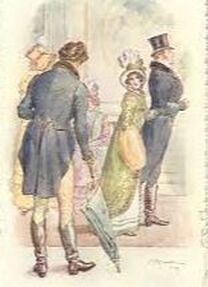 At Molland's on Milsom Street
At Molland's on Milsom Street In Persuasion, Molland’s is the setting for an encounter between Anne, Captain Wentworth and Mr. Elliot which leaves Captain Wentworth with the notion that Mr. Elliot and Anne will be married. Austen could have placed this unhappy turn of events in a park, or at the Pump Room, but—significantly—she chose a shop. While Anne is stuck at Molland's, waiting for Mr. Eliot's return, there is not a single mention of her looking around at whatever is on sale in the store. She looks outside and up and down the sidewalk, never around her. She can't wait to get out of there: "She now felt a great inclination to go to the outer door." Who does have some kind of shopping errand in this scene? The two villains of the piece, Mr. Elliot and Mrs. Clay.
In another subtle and deft touch in Persuasion, Anne encounters Admiral Croft as he stands outside a shop, contemptuously rejecting the paintings for sale within. This stamps him as one of Austen's upright and good characters.
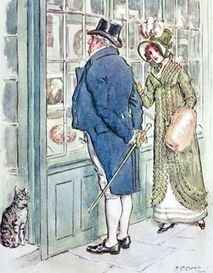 Admiral Croft and Anne Wentworth
Admiral Croft and Anne Wentworth By now it should be no surprise to realize that Austen marks out General Tilney as a villain by showing him as a man who is always boasting about his possessions, such as his breakfast set of Staffordshire china. He tells Catherine that he “thought it right to encourage the manufacture of his country.” Catherine, young and naïve, is absolved by Austen from complicity in all of this. While Henry and his sister Eleanor understand that their father is all for the exploitation of the proletariat, “Catherine was probably the only one of the party who did not understand him.”
Was this bold and radical critique included in the original version of the novel, titled Susan, or was it a later interpolation after Austen’s brother retrieved the unpublished manuscript? Did Austen, in fact, add this more daring scene shortly before her death? We can only speculate, but Austen appears to have grown more radical and outspoken as she matured as a writer.
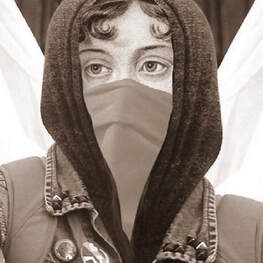
Critically tracing the development of Austen's anti-capitalist thought through all six of her novels shows that Sanditon was intended to be the culmination of her efforts. Capitalism rears its ugly head, although subtly, in all her works.
To say that Austen is deeply mistrustful of the future of places like Sanditon is an understatement. The looming catastrophe of the new capitalist order hangs over the book like an ominous shadow. There is no doubt about it--Austen was on the right side of history, she wanted to smash capitalism, and her opinions accord completely with my own views.
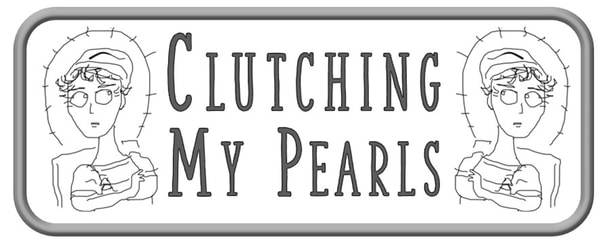
 RSS Feed
RSS Feed